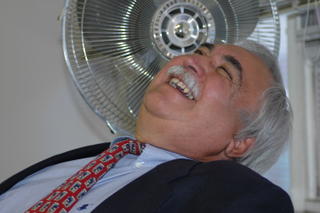My big sister, Dr. Maria Carlota Baca, is the big cheese at the New Mexico Association of Grantmakers. That is just what it says, a group of Grantmakers who give money to worthy causes in New Mexico. Every month she puts out a news letter and writes a column for it. I particularly like this months. Read it with the knowledge that we are spending unfathomable amounts of money for our oil war.
Director’s Column
M. Carlota Baca, Executive Director, NMAG
Some time ago, I was in Walgreen’s refilling some prescriptions. Because I have good insurance, I can get 90 pills of anything for a flat $15 (cheaper if they’re generic). For the uninsured, a three-months’ supply of Lipitor costs $363.69! Thus, I pay $60 for a year’s supply while an uninsured person pays close to $1500 a year for the same thing.
On that day, I was waiting in line behind a slight, elderly man. When his turn came, he was handed a very small bottle of pills and he took out over $200 in cash to pay it. I was stunned and when he walked away, I spoke to the young woman at the counter. “God, I worry about how these older people who have to pay cash are managing.” I said, nodding at the departing old gent.
“Almost half of our customers are in the same situation,” she said. “Sometimes, I see people actually start to cry when I tell them how much it is. I just can’t stand it! Sometimes I just want to get a different job.” Her emotional response made me realize how insulated I am, and how, everyday, she sees the problem up close.
I’ve carried that recollection around with me since it happened. I always knew poverty and need were around me, but I guess I was seldom in line right behind it. I realized that I lead a very sheltered life.
Recently I heard about another way that the working poor pay more than I do for something rather basic—financial services: I’m sure that you’ve seen those quickie payday loan shops in your towns. According to one study, the people who use these outfits may end up, ultimately, paying about 40% of their income in debt service! It’s made me realize that poverty is sort of a bottomless pit. Once you’re in it, it’s very, very difficult to climb out. I highly recommend a book I read last year, “The Working Poor: Invisible in America” by David K. Shipler. It’s a shocker.
Philanthropy in its earlier forms in this country was very straightforward about addressing poverty. Carnegie, Ford, and other giants were, of course, the underwriters of great civic institutions such as libraries, museums, parks, symphonies and the like, but they also were dedicated to diminishing poverty because it made good economic and civic sense for the nation. Less poverty was good for business.
About every few months, a man used to come to my door and ask if I would like new blacktop on my driveway. I always said no thanks. He was hustling, he was working the neighborhood, and he was all business. He came again last week and this time, I said, “Sure, my driveway really needs it.” He did a terrific job and he didn’t charge very much. He did the entire job himself with no helpers and I hope he felt that he got a fair price for his grueling work.
John Kenneth Galbraith once said, “The arithmetic of modern politics makes it tempting to overlook the very poor, because they are an inarticulate minority.” This man who rang my doorbell was barely able to speak English. He didn’t have business cards so I had no way to call him later if I changed my mind. I realize that he probably did not report the income, so I guess I am part of the “undocumented-worker, low-wage mess.”
He certainly didn’t have the time or education to address articulately the public policy issues of immigration, labor, a living wage, fringe benefits and the absolute need for the human dignity that comes with work. I realize that he probably won’t come back now, and he has no phone, so I have no way to recommend him to you. All I have is his name, which is Jesús.
 We were up early this morning for the daily three mile hike into the Bosque along the Rio Grande. It was especially nice today because my son Justin and his girl Karly went with me and the Beagles. The Bosque is becoming overgrown with alfalfa. It has obliterated the trails. I think since the dead trees were taken down after the fire that the ground is getting a lot more sunlight and this alfalfa has just loved it.
We were up early this morning for the daily three mile hike into the Bosque along the Rio Grande. It was especially nice today because my son Justin and his girl Karly went with me and the Beagles. The Bosque is becoming overgrown with alfalfa. It has obliterated the trails. I think since the dead trees were taken down after the fire that the ground is getting a lot more sunlight and this alfalfa has just loved it.






